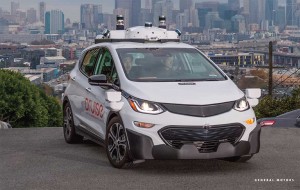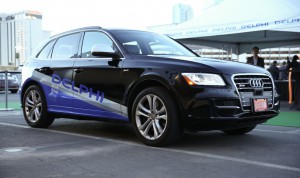
A new study from the Center for Automotive Research shows that consumers are more interested in EVs that self-driving cars.
Despite all the new truck, sport utility vehicle and crossover vehicles launched at last month’s North American International Auto Show, presentations from carmakers also focused on the future of connected and autonomous vehicle technologies, new mobility service models, and advanced powertrain solutions, according to a new study from the Center for Automotive Research noted.
“Automakers are making big bets and hope they will pay off. Ford Chairman Bill Ford summed up the divide when he announced his company’s $11 billion investment in EVs in January 2018, “… we’re all in now. The only question is will the customers be there with us, and we think they will,” noted the CAR study, which was released last week at a meeting to the Automotive Press Association in Detroit.
Meanwhile the U.S. automotive industry is in the midst of a critical period. Light vehicle sales are plateauing at a very high level and include a rich mix of pickups, SUVs and CUVs that are producing record profits.
In addition, consumers remain skeptical of the new technology in which carmakers and their suppliers are investing.
(Lawmakers look at alternatives to gas tax as highway infrastructure crumbles. Click Here for the story.)
“Consumer interest in alternative powertrain technology is a critical first step to increased sales, but consumer surveys on future purchase intentions are often hard to interpret,” the CAR study noted.
Data from a consumer “engine preference” survey for selected countries indicates that globally, consumers have a solid interest in hybrid-electric and battery-electric vehicles. While 18% of U.S. respondents indicate a preference for HEVs and BEVs, European respondents express an even higher preference for the technology – 30% Germany, 25% in France.
Chinese consumers top the list with a reported 56% preference for HEV and BEVs. The current market share of BEVs and HEVs is 3.3% in the United States and even smaller in France, Germany and China. “There is a disconnect between consumers’ expressed intent and their actions,” CAR noted.
“Current and upcoming global regulatory pressures, combined with technological advancements, may lead the composition of vehicles sold in the U.S. market to further deviate from much of the rest of the global automotive world,” the study noted.
CAR also found that the move towards autonomous vehicles could be significantly slower than a move towards electrified powertrains.
“The share of autonomous-capable vehicles sold increases steadily throughout the 2030s and comprises over half of all new vehicles sold by 2040,” CAR predicted. The CAR prediction is about a decade behind more optimistic projections from global automakers and tech companies in Silicon Valley.
(Click Here to see how autonomous EVs will impact ride-sharing.)
The mixed fleet—personal ownership and shared mobility—will likely persist for decades. Developing and manufacturing a light vehicle is a costly endeavor with uncertain paybacks. CAR also outline another set of variables that could slow the revolution in automotive technology.
Automakers must justify their platform and powertrain business cases over a multi-year time horizon to meet internal rate of return hurdle rates or the targeted level of return on invested capital.
“Capital and human resources are typically constrained, and current technology trends have tightened the constraints even further,” CAR said.
CAR also cautioned United States’ technological leadership could be at stake.
Most automakers and suppliers agree that the “three revolutions” of automated, shared, and electric vehicles will be transformative.
(To see more about China extending incentives for electric vehicles, Click Here.)
“However, it may take decades for this idealized future to take hold, and even then, automated, connected, electric and shared vehicles (ACES) will not make sense in every region of the country or every climate,” the CAR study said.


Before the market is flooded with tens of millions of battery packs, I hope enough thought is given on how they will be recycled.